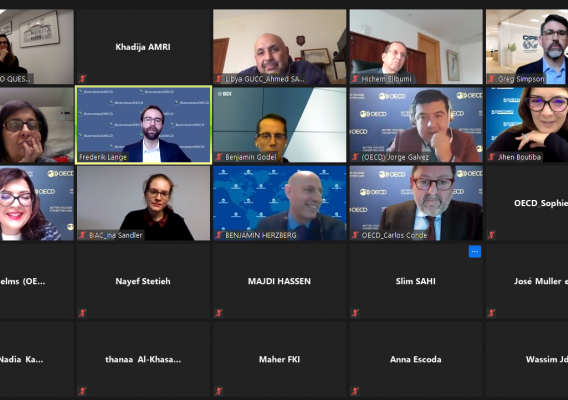BUSINESSMED presents the priorities of the private sector during the last BAB meeting in 2020
BUSINESSMED presents the priorities of the private sector during the last BAB meeting in 2020
The MENA-OECD Business Advisory Board (BAB) met virtually on December 9 and 10, 2020 during a webinar that was jointly organised by the OECD and the co-chairs of the BAB, the Tunisian Confederation of Industry, Trade and Handicrafts (UTICA) and the Confederation of Employers and Industries of Spain. The strategic discussions focused on the impact of and recovery from the COVD-19 pandemic for the business community in the Middle East and North Africa, looking to the future to set priorities.
The webinar gathered business associations and chambers of commerce representing 9 MENA economies and 10 OECD countries. Regional and international institutions took part in the discussions along with BUSINESSMED, such as CIPE, BIAC and the World Bank. The 2020 annual meeting launched a reflection on the future work of the BAB in the context of recovery from the COVID-19 pandemic and the new mandate of the MENA-OECD Competitiveness Programme (2021-2025).
The discussions covered three thematic main priorities: the impact of the COVID-19 pandemic on the MENA business community, the role of Public-Private Dialogue for crisis recovery and the strategic priorities for the BAB within the new mandate of the MENA-OECD Competitiveness Programme.
During her intervention, the General Secretary of BUSINESSMED stated: “Planning for long-term recovery is a challenge for MENA, made harder by pressures to prioritise short-term emergency spending. Thus, we need to shift to inclusive economic reforms, including informal sector integration in the mainstream economy. We also need to strengthen and promote inclusive and effective Social Dialogue among all stakeholders.”
A special session allowed for focused discussions on the impact of the COVID-19 pandemic on the tourism industry in the region, a sector that was and still much affected by the current COVID crises.









